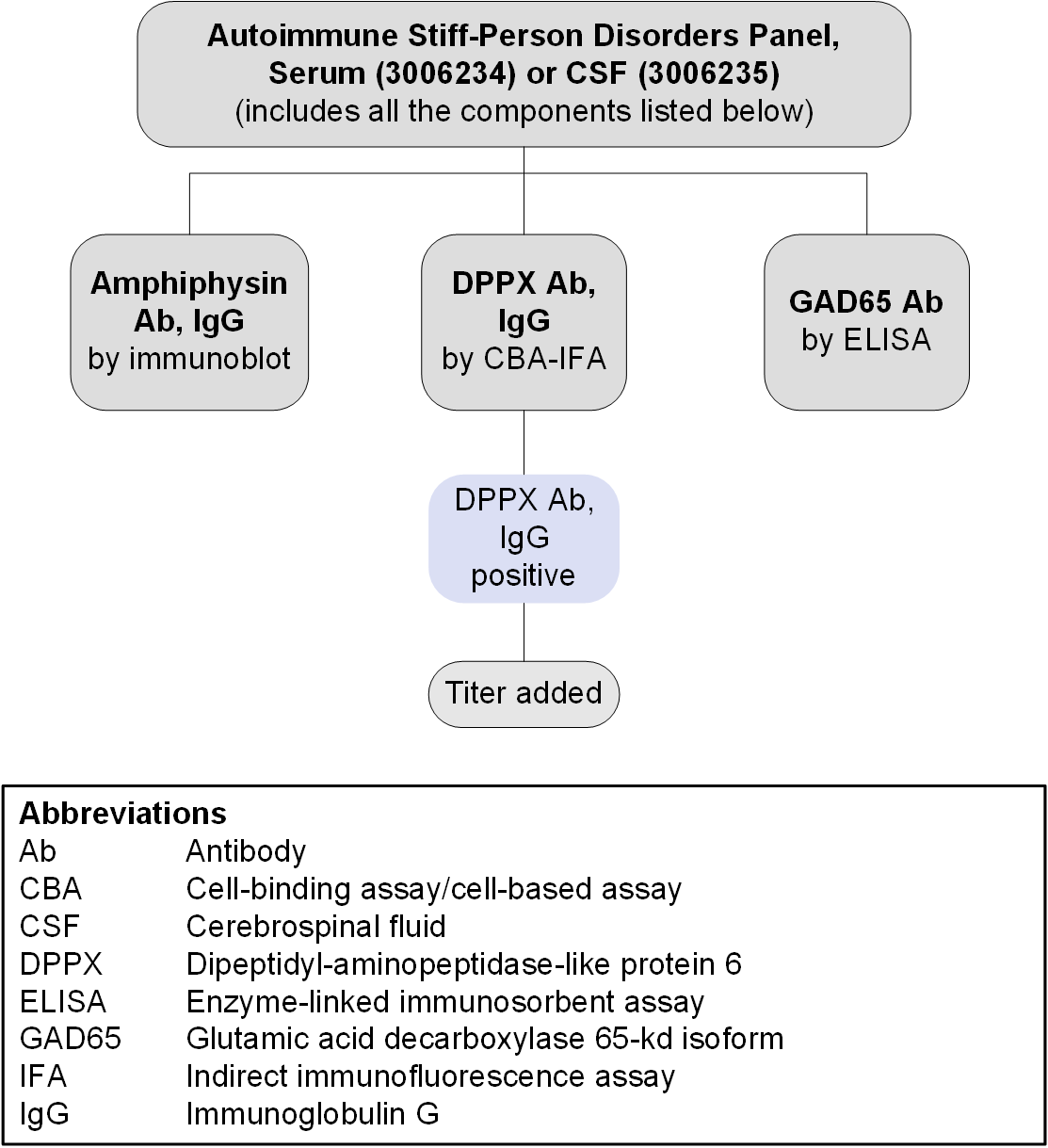Semi-Quantitative Cell-Based Indirect Fluorescent Antibody/Qualitative Immunoblot/Semi-Quantitative Enzyme-Linked Immunosorbent Assay (ELISA)
Semi-Quantitative Cell-Based Indirect Fluorescent Antibody/Qualitative Immunoblot/Semi-Quantitative Enzyme-Linked Immunosorbent Assay (ELISA)
Stiff-person spectrum disorders may be paraneoplastic or idiopathic and can present with a broad range of phenotypes. Antibodies found in these disorders are associated with an immune-mediated loss of neuronal inhibitory pathways, leading to hyperexcitability.
Disease Overview
Stiff-person spectrum disorders encompass classical stiff-person syndrome, partial/focal stiff-person forms such as stiff-limb and stiff-trunk, pure cerebellar ataxia, and a severe encephalomyelitic form referred to as progressive encephalomyelitis with rigidity and myoclonus (PERM). Symptoms commonly include exaggerated startle responses, falls, painful spasms, and stiffness. Classical stiff-person syndrome typically affects the lower back and lower extremities, whereas the focal forms are limited to either the limbs or the trunk. Patients with PERM exhibit a more severe form that also includes dysautonomia, encephalopathy (often with seizures), and myoclonus (muscle jerking). Treatment of patients with stiff-person spectrum disorders ranges from symptomatic medications to immunomodulatory therapy, and treatment responses vary. , ,
For more information about laboratory testing for autoimmune neurologic diseases, refer to the ARUP Consult Autoimmune Neurologic Disease - Antineural Antibody Testing topic.
Test Description
These serum and cerebrospinal fluid (CSF) autoimmune stiff-person disorders panels can be used for the evaluation of patients with stiffness, spasms, hyperekplexia, limb rigidity, myoclonus, or limb dystonia in the presence or absence of encephalopathy. Testing for the presence of antineural antibodies in both serum and CSF may improve diagnostic yield. Low glutamic acid decarboxylase 65-kd isoform (GAD65) antibody titers in serum should be followed by CSF testing to confirm the diagnosis.
These phenotype-targeted panels test for the presence of antibodies associated with stiff-person spectrum disorders. Clinical phenotypes for specific antineural antibody-mediated syndromes often overlap, and phenotype-specific panels allow for rapid identification of associated antibodies, which has implications for treatment, prognosis, and cancer screening.
For patients presenting with a broader phenotype concerning for immune-mediated movement disorder, consider ARUP’s Autoimmune Movement Disorder Panel in serum (3018964) or CSF (3018966).
Regardless of the panel chosen, order only one panel for serum and/or one panel for CSF; many antineural antibodies are redundant between these panels, and choosing based on the predominant phenotype will provide the most meaningful results. To compare these panels and the antibodies included, refer to the ARUP Antineural Antibody Testing for Autoimmune Neurologic Disease page.
Testing for individual antibodies is also available separately.
Antibodies Tested and Methodology
Autoantibody Markers
| Autoantibody Markers | Methodology | Individual Autoantibody Test Code | |
|---|---|---|---|
| Serum | CSF | ||
| Amphiphysin Ab, IgG | IB | 2008893 | 3004510 |
| DPPX Ab, IgG | CBA-IFA, reflex titer | 3004359 | 3004512 |
| GAD65 Ab | ELISA | 2001771 | 3002788 |
| Ab, antibody; CBA, cell-binding assay/cell-based assay; DPPX, dipeptidyl-aminopeptidase-like protein 6; ELISA, enzyme-linked immunosorbent assay; IB, immunoblot; IFA, indirect immunofluorescence assay; IgG, immunoglobulin G | |||
Reflex Patterns
Autoimmune Stiff-Person Disorders Panel, Serum (3006234) and CSF (3006235): Reflex Patterns

Limitations
This panel does not include every antibody that has been associated with autoimmune stiff-person disorders:
- Glycine receptor antibody testing is not included because it is not performed at ARUP Laboratories.
- Glycine receptor antibody testing may be ordered by contacting ARUP Client Services at 800-522-2787 or clientservices@aruplab.com. Testing will be sent to a referral laboratory.
- As testing for newly described antibodies becomes available and their clinical relevance is established, these panels will evolve to reflect these discoveries.
Test Interpretation
Results
Results must be interpreted in the clinical context of the individual patient; test results (positive or negative) should not supersede clinical judgment.
| Result | Interpretation |
|---|---|
| Positive for ≥1 autoantibodies | Autoantibody(ies) detected Supports a clinical diagnosis of autoimmune stiff-person spectrum disorder Consider a focused search for malignancy based on antibody-tumor associations |
| Low positive for GAD65 Ab in serum | Possible association with systemic autoimmunity not associated with neurologic disease (ie, autoimmune diabetes); interpret cautiously based on clinical presentation |
| Negative | No autoantibodies detected A diagnosis of autoimmune stiff-person spectrum disorder is not excluded |
References
-
35717735
Newsome SD, Johnson T. Stiff person syndrome spectrum disorders; more than meets the eye. J Neuroimmunol. 2022;369:577915
-
35084720
Dalakas MC. Stiff-person syndrome and GAD antibody-spectrum disorders: GABAergic neuronal excitability, immunopathogenesis and update on antibody therapies. Neurotherapeutics. 2022;19(3):832-847.
-
11756577
Dalakas MC, Fujii M, Li M, et al. High-dose intravenous immune globulin for stiff-person syndrome. New Engl J Med. 2001;345(26):1870-1876.
-
35798561
Yi J, Dalakas MC. Long-term effectiveness of IVIg maintenance therapy in 36 patients with GAD antibody-positive stiff-person syndrome. Neurol Neuroimmunol Neuroinflamm. 2022;9(5):e200011.
-
19210912
Dalakas MC. Stiff person syndrome: advances in pathogenesis and therapeutic interventions. Curr Treat Options Neurol. 2009;11(2):102-110.
-
32123047
Muñoz-Lopetegi A, de Bruijn MAAM, Boukhrissi S, et al. Neurologic syndromes related to anti-GAD65: clinical and serologic response to treatment [published correction appears in Neurol Neuroimmunol Neuroinflamm. 2020;7(4)]. Neurol Neuroimmunol Neuroinflamm. 2020;7(3):e696
-
33221892
Budhram A, Dubey D, Sechi E, et al. Neural antibody testing in patients with suspected autoimmune encephalitis. Clin Chem. 2020;66(12):1496-1509.


 Feedback
Feedback